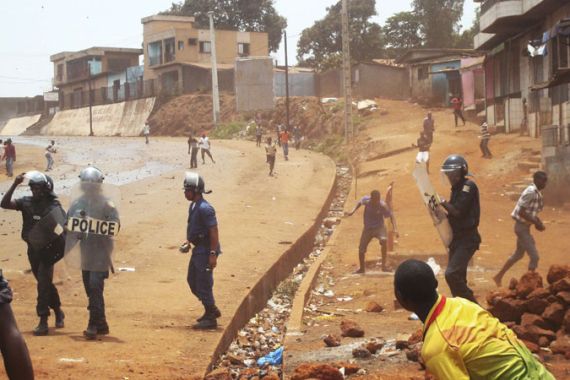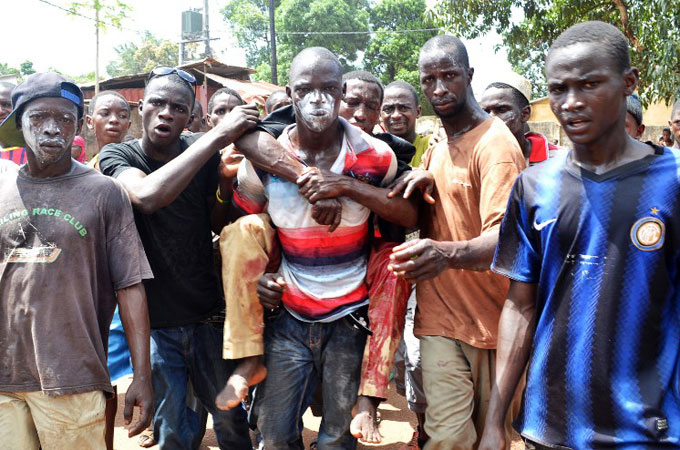Deaths of protesters herald Guinea’s election
More than 50 people have died in escalating ethnic-political violence ahead of the West African nation’s June poll.

Dakar, Senegal – Twelve people have been killed and at least 89 injured in the West African nation of Guinea over the past week, as waves of violence grip the country ahead of legislative elections scheduled for late June. More than 50 people have died since February in clashes between government forces and the opposition.
Opposition members, who come primarily from the Peuhl ethnic group, blame the deaths on government security forces which are dominated by the Malinke ethnic group.
The opposition says the past week’s fatalities are the result of security forces violently repressing legal protests.
 |
| Demonstrators carry an injured protester after clashes with police on May 24 [AFP] |
In a statement released on Monday, the government confirmed that twelve people had died in violent confrontations since May 21. More than half of the fatalities were the result of gunshot wounds, according to the statement, although the “origin of the shots remains unknown”.
Altercations between opponents of President Alpha Condé’s administration and security forces have been an almost weekly occurrence in the capital, Conakry, for the past several months.
The opposition says that the government has not met their demands for transparency in the upcoming legislative elections. Voters are scheduled to elect new members of the National Assembly, which has not met since a military coup rocked the country in 2008.
Guinea, a mineral rich country with a little more than 10 million citizens, is no stranger to ethnic and political violence. The two primary ethnic groups, the Peuhls (who represent around 40 percent of the population) and the Malinke (around 30 percent) are often at political odds, experts say, with political candidates shoring up support from within their own communities.
In 2009, tens of thousands of pro-democracy protesters, a large proportion of them ethnic Peuhls, gathered at a stadium in Conakry. Security forces entered the stadium, slaughtering at least 150 people and committing mass rapes, according to a Human Rights Watch report. Many survivors said the security forces used racial slurs against Peuhls during the attacks.
The country’s current leader, Alpha Conde, came to power in 2010 in an election that “turned out to be a lot about ethnicity”, said Vincent Foucher, a senior analyst with the International Crisis Group. The main opposition group, the UFDG, was widely supported by Peuhls, while “the Malinke contingency voted massively for Alpha Conde”.
Conde, who reportedly counts Tony Blair and George Soros among his international supporters, has been locked in a bitter battle with the Peuhl dominated opposition over the upcoming legislative elections – originally scheduled for July 2012, but pushed back to June 30 of this year.
The opposition has demanded that Guineans living abroad be allowed to vote in the election, and also that Waymark, a South African company hired by Conde’s government to update voter registration lists, be stripped of its commission.
“They suspect that there is a special connection between South Africa and Alpha Conde and that this choice is not innocent,” explained Foucher. Waymark vehemently denies any such claims.
The opposition has said that, beyond a mere boycott, it would “block” the electoral process if demands were not met. “It’s unclear what that actually means,” Foucher said.
Some Guineans are frustrated by the opposition’s approach.
I think they have fuelled the conflict, and ever since September 2009 they have just gotten used to sending people to the street to just get killed to gain political credit.
“I don’t agree [with] how the opposition has handled this,” said Mamadou, a Guinean Peuhl living abroad with his family. “I think they have fuelled the conflict, and ever since September 2009 they have just gotten used to sending people to the street to just get killed to gain political credit,” he said.
Heavy toll
The political crisis has hurt the country. Additional violence has flared because of protracted electricity and water cuts in Conakry. While Guineans have long suffered from substandard infrastructure, the situation “has been worse than usual”, said one Conakry resident who asked not to be named. “The government has mismanaged vital [infrastructure] projects… The projects were run by people from the ruling party instead of professionals from the field.”
Amid political discontent and crumbling infrastructures, the situation came to a head last week. “Young bandits, claiming to be part of the opposition, took over entire neighborhoods of Conakry, sowing terror,” the same resident said.
Violent confrontations between the opposition and the security forces ensued, resulting in the deaths of more than ten opposition protesters.
Government troops have been accused by residents of Peuhl dominated areas of looting, vandalism and random shootings.
“The demonstrations have been used as a pretext for both opposition supporters as well for the security forces to engage in criminal behaviour,” said Corinne Dufka, a senior research analyst in Human Rights Watch’s Africa division.
With the mounting number of opposition deaths, however, the international community has begun to look more critically upon President Alpha Condé.
A widely circulated list naming those killed over the past week claims victims as young as thirteen. The surnames on the list are largely Peuhl, noted Dufka. “This dynamic serves to further fuel ethnic tension between the Malinke and Peuhls which has for rising in recent years,” she added.
“Given the abusive history of the security forces and given the mounting death toll, we’re especially concerned that there have been numerous incidents of excessive lethal force,” she said.
In response to the escalating violence and rising death toll among the opposition, President Condé replaced his interior minister and called for a special inquiry into the deaths.
Condé is adamant that elections be held without further delay. Having compromised on previous issues, including replacing the president of the national election commission, he appears unwilling to meet the opposition’s latest demands. On Wednesday, Conde officially fixed the June 30 election date by presidential decree, announcing a month-long campaign leading up to the vote.
While much of the international community is pushing for the election to take place in June, many Guineans doubt the vote will resolve the country’s problems. “Given the ethnic make up in the country [an election] is not the most practical solution at this point,” said Mamadou.
Because political parties are divided along ethnic lines, the country’s election process fuels bigotry, he said. “Unless there are strong protections of minority voices, elections in Guinea will always exacerbate tensions between the main ethnic groups.”
Meanwhile, Mamadou said his family in Guinea live in fear as the election date approaches.
“No-one feels safe.”